Northern Sea Route. World transport future or grand projecting?
At first glance, the benefits of the Northern Sea Route in comparison with the traditional routes laid between Europe and Asia through the Suez Canal are obvious. For example, the route through Suez from Korea to England has a length of over 23 thousand km, and the same road through the NSR will be only over 14 thousand km.
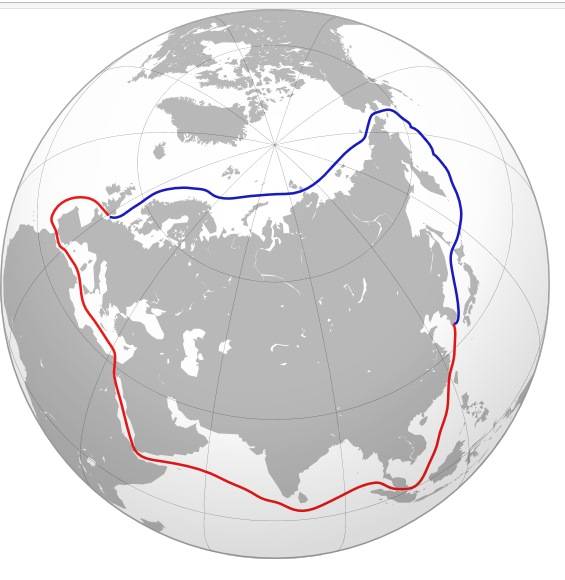
In other words, the route through the Russian North is much shorter than through the southern seas and the Indian Ocean. And this is considered by many to be the key factor that will determine the commercial success of the Northern Sea Route.
So the “fruit of collective wisdom” named Wikipedia suggests the following economic benefits of the NSR:
1. Savings on fuel, the cost of freight of the vessel and the salary of its crew.
2. No payment for the passage of a vessel that exists in the Suez Canal.
3. No queues (as is the case with the Suez Canal).
4. No risk of piracy attacks.
And dear Viktor Kuzovkov, the author of the article posted on "IN" “Growth of Russian influence in the Arctic. Will it get hot in the ice? ” adds to this also the geopolitical factor. Which lies in the fact that the route through Suez runs in the control zones of the US Navy and NATO. In an era when China was nothing more than the silent factory of Uncle Sam, this was completely irrelevant. But now, when China is an economic and political giant waking up on its feet and not afraid to resist the United States in a number of areas, its maritime transport arteries may also be “pressured”. Well, on the Russian SMP, of course, nothing like this can happen, therefore the Northern Sea Route is of great interest to the Chinese leadership.
Let's try to figure out how all this is correct.
Saving on ship's freight
It would seem that something much simpler - since flights through the SMP are shorter than through Suez, then you will have to pay less to rent a transport vessel. But let's first think about this — what boat will you pay to rent it cheaper? Or, paraphrasing this question - what kind of vessels can sail the Northern Sea Route?
There is such a thing: “ship's ice class”, and this is a whole hierarchy, which is regulated by the “Russian Maritime Register of Shipping”. In others, the country has its own similar documents, but our most detailed and detailed, so take it as an example.
So, at the very bottom of the hierarchy are vessels that do not have ice class at all and are not intended for circulation in areas where ice is possible. Then Ice1 goes, the ships that have been assigned this class are allowed to make independent episodic sailing in the thin ice of the non-Arctic seas and in continuous ice in the channel behind the icebreaker with ice thickness up to 0,4 m. 2 m. But only in non-Arctic seas.
Then the arctic classes begin. There are six of them, they start with Arc4 (L1), which are allowed independent swimming in rarefied annual Arctic ice with their thickness up to 0,6 m in winter-spring navigation and up to 0,8 m in summer-autumn. For an icebreaker, you can go in the ice thickness up to 0,7 m in the winter-spring and up to 1,0 m in the summer-autumn navigation. And Arc9 ends, which are able to independently break through the long-term arctic ice 3,5 m in winter-spring navigation and up to 4,0 m in summer-autumn. Well, after that icebreaking classes Icebreaker6-9 begin.
So what kind of ships can sail the Northern Sea Route? Yes, any! Even those who do not have ice class. Here they can only walk the summer-autumn navigation, which lasts from 2 to 4 months in a year, depending on the ice conditions.
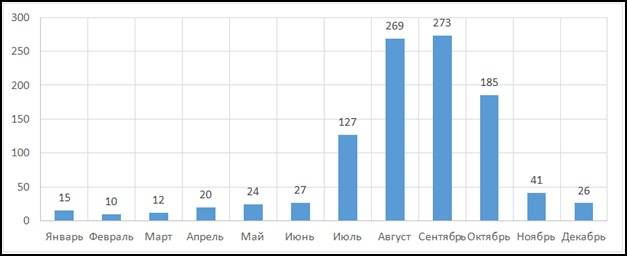
At the same time, for the passage of the SMP, the help of icebreakers is required. Even in the summer. No, here, of course, some options are possible - if the weather is very favorable, then a small transport vessel that does not have an ice class may be able to slip along the coast. But it may not slip through, much depends on nature: in the normal state of the NSR, an icebreaker will still be needed.
And what about the spring-winter navigation, which means the 8-10 months in a year on the NSR? Everything is very simple here - vessels with ice class not lower than Arc4 are allowed on the northern route, and they must be strictly accompanied by icebreakers. Theoretically, the SMP can try to go without icebreaker escort, but this is not always possible (everything depends on nature again), and only vessels with ice class not lower than Arc7 can venture on it. And here everything is not easy, as the author is not entirely clear whether even Arc7 can make its way between Dudinka and Chukotka.
Naturally, in order to go from China or Korea through Suez, no ice class is needed.
So it turns out that instead of leading the cargo through Suez, you can charter absolutely the same vessel and go on it via the NSR. But only 2-4 of the month of the year. And what to do with this very ship the rest of the time? Obviously, “drive” through the same Suez. Thus, such freight will bring profit to its owner far from the whole year round.
But in order to walk all year round, the SMP - if you please, build an Arc4 ice-class vessel, and better Arc7.
How expensive is it? Alas, the author will not be able to give exact figures, but judging by the amount of work, it is much more expensive. In order for a ship to sail in the ice, it needs to be strengthened literally in all respects. Absolutely all the elements of his set must be stronger - frames, stringers, set beams, stem. Besides the fact that the skin and decks should be stronger, we also need special “linings”, the so-called ice belts. The power plant should be more powerful, since it will not only have to “push” the vessel itself, but also “shove” the ice, even if it follows the icebreaker.
And the convenience of the crew? Sorry, but to provide acceptable conditions for his life and work on a ship in the southern seas is one thing, and on the NSR, at a temperature of minus fifty, it is “a little” another. And the load? Of course, the temperature regime is completely unimportant to many categories of cargo, but there are others. And what to do for them also heated holds?
Little of. It should be understood that the Northern Sea Route is the north. Even not so - this is the Real Russian North, the conditions of existence on which are not just complex - they are extreme. And the equipment there wears out much faster than in relatively mild equatorial conditions. This fact even the domestic tax has managed to recognize, allowing the amendments to apply to the depreciation period for equipment operating in the Far North. Therefore, the service life of the polar ships will either be less than their “equatorial counterparts”, or they should be made more expensive during construction in order to provide an increased resource.
It is clear that all of this is only general reasoning, but if we take up the assessment of the economic efficiency of a ship’s freight, we must take into account all of the above factors, and also, surely, a lot of things that the author, not being a professional, simply could not mention. But you need to understand that as a result of a correct calculation that takes into account all factors, the cost of freight of a ship that is able to sail under polar conditions may turn out to be even higher than a ship for the southern seas. Despite the shorter route distances.
Fuel cost savings
She certainly will. Here, for example, the Chinese merchant ship "Tianjian", "slipped" along the Northern Sea Route to the city of Esbjerg in Denmark, saved 15 days of travel and 383 tons of fuel. It left the port of Lianyungang and made it to Esbjerg in Denmark, breaking the 6280 nautical miles, and this is 4779 less miles than if the ship went through the Suez Canal.
Is it a lot or a little? Taking into account the fact that the cost of fuel, according to the data available to the author, can range from 150 to 400 dollars per ton (price in Singapore is 2014-2016 g) the benefit in the summer months for this vessel was (roughly) from 58 to 153 Thousands of dollars. Is it a lot, or a little? "Tanjian", generally speaking, is not too large vessel.
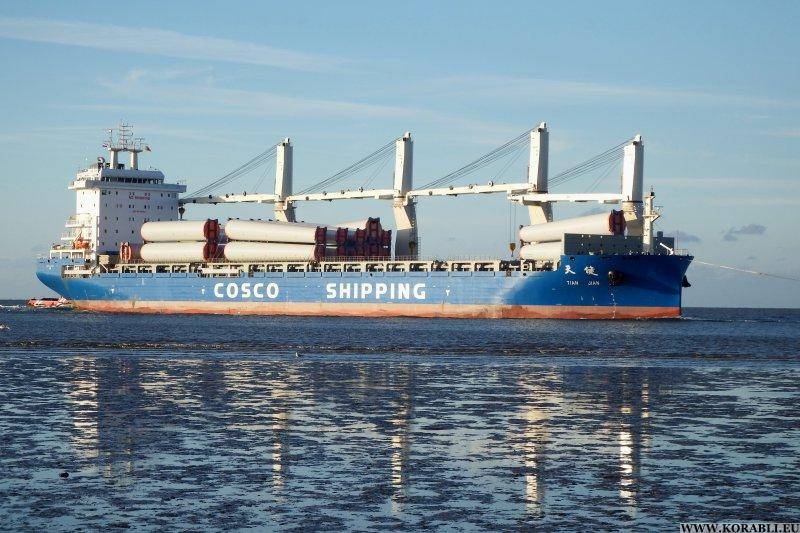
Its gross tonnage is 26770 tons, deadweight 37979 tons. 189,99 meter length, 28,5 meter width, 8,6 meter draft. The maximum recorded speed of the 15,1 node.
If we assume that Tianjian was fully loaded on this flight, it turns out that savings per ton of cargo amounted to 2,16-5,71 dollars. This is quite a lot. But let's not forget that Tianjian passed in one of the two most comfortable months. Do not forget that the Arc4 ice class ships will have a higher fuel consumption per ton of cargo than conventional ships of the same gross tonnage (heavier hull, more powerful power plant). And yet, let's not forget that the larger ships have a significantly lower fuel consumption per ton of transported cargo (scale effect), which means there will be less savings.
Further. As far as can be understood from the publications, Tianjian did without the help of an icebreaker (although this is not a fact), but in winter, or in more difficult ice conditions, it would have failed to save 15 days — no matter how cool it is, but the speed behind the icebreaker will be lower accordingly, the time on the route will increase. And further. The complexity of the ice situation is directly dependent on the distance from our shore. That is, the closer to the North Pole - the thicker the ice. It seems to be, well, what's the problem - go closer to our shores ... And the problem is actually very big, because, oddly enough, these areas are shallow. And large-tonnage vessels having a draft of up to 15 m cannot be carried out near our shores, their routes will have to be run much further north, that is, where they definitely need the help of icebreakers.
Savings on crew pay
There will be no savings, because there will be a continuous overrun. No, of course, if we assume that the crew will receive payment for their work at exactly the same rates as for the southern seas - then it is of course. For example, if we assume that Tianjian when going through the NSR went at the same average speed that it would take along the route through Suez, then in this case, with hourly rates, the savings would be approximately 43% of the amount that spend while sailing through Suez.
But let's not forget that walking by the Northern Sea Route is much more difficult work than to walk around the Indian oceans there. We have, throughout the SMP, the regional coefficient 2 operates - that is, an employee of the same profession will receive twice as much on the wage scale than his colleague of the same qualification somewhere in the Moscow or Leningrad regions. And under market conditions, wage differentiation cannot be avoided - the crews will have to pay much more expensively for regular labor on the Northern Sea Route than for regular routes through Suez.
By the way, the question is not only in working conditions. Besides, the captain also needs special training for swimming in ice conditions, that is, such a captain will be more qualified.
No payment for the passage of the Suez Canal
What is, that is, following along the Northern Sea Route, you will not have to pay for the passage by the Suez Canal. But you have to pay icebreakers for the wiring. How expensive?
A little more than 5 years ago, by order of 4 in March 2014, the Federal Tariff Service approved tariffs for icebreaker escort vessels rendered by Atomflot FSUE.
These rates are calculated on the 1 tonne of cargo carried, and depend on the ice class of the vessel, its gross tonnage, navigation and route length. There is no point in bringing out completely, but we note that the same “Tianjian”, if it does not have an ice class, would be paid 1 072,42 rubles if it was wired to all the zones. per ton of gross tonnage (and not actually carried cargo). In March, the 2014 g dollar is approximately 36 rubles, so the Chinese would have to fork out about $ 30. But it is in the summer. But in the winter-spring navigation, "Tanjian", in the absence of an ice class, would not have been allowed at all. Well, if he has it, and according to Russian standards it corresponds to, say, Arc4, then a passage would be possible, but at the same time the rate would increase to 1 340,57 rubles. or 37,23 dollars per ton.
A similar rate for the passage of the Suez Canal is from 8 to 12 dollars.
But what is interesting is that, apparently, the tariffs of Atomflot did not change even now. It is obvious that after more than 5 years they have become pretty outdated and hardly provide any acceptable profit to our FSUE - after all, during this time, even according to official data, inflation exceeded 42%. Apparently, there is a shout "from above" in order to make an attractive passage along the NSR for foreigners. But even today, when the dollar is worth 65 rubles, Tianjian would have to pay approximately 16,5 dollars in the summer-autumn navigation and 20,62 dollars in the winter. As you can see, the tariff for winter navigation completely “ate” all the savings on fuel (about $ 6 maximum), and still remained higher than the payment for passage through the Suez Canal.
No queues
Lack of queues and associated downtime would be great if not for one “but!”. Today, when the volume of cargo traffic on the Northern Sea Route is small, our icebreaking fleet is quite capable of conducting ships on demand, that is, when such an order appears. But what will happen if a multiple increase in the number of ships occurs? And if their number grows by orders of magnitude, what, in fact, do many dream of turning the NSR into a “new silk road”? Alas, no reasonable amount of icebreakers will cope with this, willy-nilly it is necessary to form caravans. And caravans mean downtime, while caravans form, there is nothing to be done.
No risk of pirate attack
This is really something, but pirates on the Northern Sea Route are not expected for sure. But let's think about how “pirated” risks are compensated? Very simple - by insuring the goods. Thus, the question smoothly flows into the cost of insurance, although some prefer to use mercenaries to protect cargo.
The only question is whether the insurance of ships moving through the NSR will be cheaper than the usual insurance when following the route through Suez? Well, yes, of course, there are no pirates, but in the presence of practically deserted terrain, with very difficult navigation conditions, with a completely undeveloped infrastructure of ports / airfields, with enormous difficulties that will arise when it is necessary to rescue crews in distress of these ships and the ships themselves. In general, it is possible that in the distant and bright future, when there will be as many ships on the NSR as there are cars in Moscow during rush hours on the roads, insurance will be cheaper, but so far this has not happened, we should expect expensive tariffs. Even in spite of the pirates.
But maybe warming?
Indeed - we have a lot of scientists here who are predicting global warming, but then the conditions of movement along the NSR should significantly improve ... But should they? The fact is that reducing the level of ice does not necessarily have to facilitate navigation. Ice conditions can become even more unpredictable, because such warming can increase the number of icebergs breaking away from thawing ice and moving in a less predictable way. Who wants to play the next Titanic?
But what about geopolitics?
In fact, the political aspect is openly crying out to foreign shippers in order not to make a bid on the Northern Sea Route.
After all, what should a company do that is going to organize year-round cargo transportation along the Northern Sea Route? First of all, build Arc4 ice class cargo ships. These ships will serve for several decades, and they should work only on the NSR, because if you have to send them to the Suez Canal, then the excessive strength of the hulls, the excess power of the machines, etc. lead them to economic inefficiency. Maybe they will certainly work in profit, but this profit will be less than that which the company would receive using ordinary ships. Accordingly, part of the profit will be lost, and in the language of the economy “lost profit” and “loss” are synonymous.
In other words, investing in the construction of the Arctic fleet, the company must be sure that in the next 30 years or more no one will prevent this fleet from navigating the Northern Sea Route, and that the passage of the NSR will remain economically viable.
And who can give such guarantees?
Oh incredible
As we see, in foreign policy Russia today is returning to the positions of the USSR. That is, the Russian Federation today is trying to resist the hegemony of the United States, while Europe, alas, remains on the side of "good guys from overseas." NATO, despite various frictions, is still preserved as an organization, and European countries quite unanimously approve the next anti-Russian sanctions. And now the Russian Federation is compelled to play the role of the “anti-American” pole of the world, only its economic and military capabilities cannot be compared with the similar capabilities of the USSR. In any case, we will have to do it, we simply have no other way out, but what kind of commercial company will be able to guarantee that the conflict between the Russian Federation and the Western world will not intensify and will not lead to some forms of economic wars that make the NSR unprofitable? Say, any monstrous harbor dues for ships unable to present a ticket for the passage of the Suez Canal?
It seems to be completely divorced from reality. But if we undertake to talk about the future, in which China’s naval blockade is possible (bees are against honey, Europe is asleep and sees how to give up cheap Chinese goods), then why not? And even if we ignore the above, and take for granted that the blockade of China is still possible, then even then it must be understood that the Northern Sea Route does not give Chinese courts economic security. The US Navy, based on Japan and the NATO Navy, based on England and Norway, is able to prevent them before the start of the NSR, or to block the passage after leaving it.
And now - about the real danger.
The tariffs that countries pay for the passage of the Suez Canal, there is one indisputable plus. They are manageable. And all because the fee for the passage of this channel goes to the state budget of Egypt. And Egypt ... how to say it ... with all due respect for its sovereignty, is absolutely not in that weight category to try to impose its rules on world powers. And if he tries to charge more than the reasonable and accepted by the parties fee, then there is no doubt that the Egyptian government will be “put on sight” very quickly.
But who can "put on" the power, whose nuclear potential is more than enough to drive the United States of America into the stone age in half an hour?
Any foreign company, evaluating the prospects for the Northern Sea Route, before building a fleet of Arctic ships, will look at the state that sets the rules on the Northern Sea Route. And what does it see? The Russian Federation, which stands in opposition to the entire Western world, but most importantly - a country with a completely unstable economy. And where is the guarantee that it is not today, but after years of 10-15, the new leadership of the Russian Federation will not want to force the company to share its profits a bit, by raising prices for icebreaking services? In this case, the shipping companies who have risked investing in the construction of the Arctic fleet will suffer extremely substantial losses, but the world community has practically no opportunity to put pressure on the Russian Federation to reduce these tariffs.
What merchant needs such risks?
Hack and predictor Aviator
It is surprisingly simple. Developing the Northern Sea Route is certainly important and necessary, because this is our transport artery, providing and supplying approximately 20 to millions of our fellow citizens of Northerners, and no one has canceled the need to export minerals. There are other reasons as well: after all, we declared the polar region from our borders to the North Pole to be our possessions, we need to live them. And, of course, if at some point in time we can offer adequate conditions for transit through the NSR, then some part of the cargo traffic can really shift from Suez to us.
But today or in the foreseeable future, the Northern Sea Route will not be able to compete with classical routes through the Suez Canal in any case, alas.
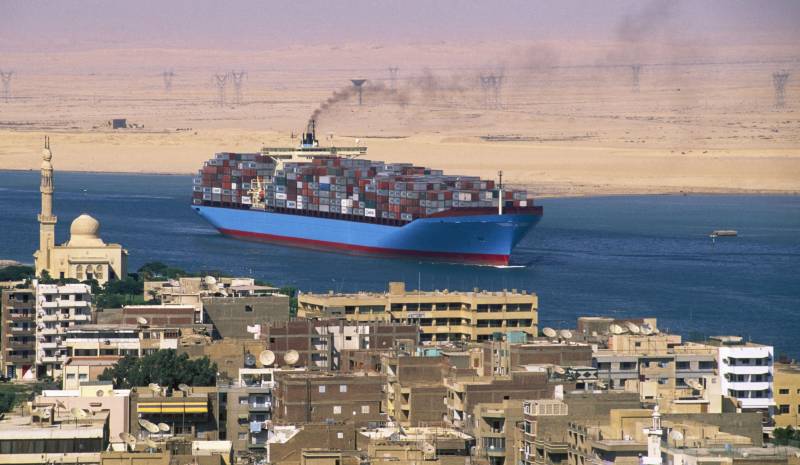
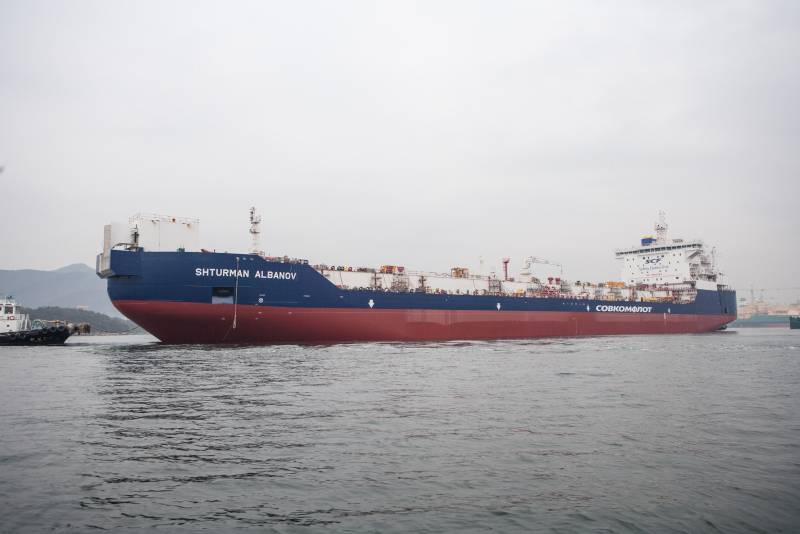
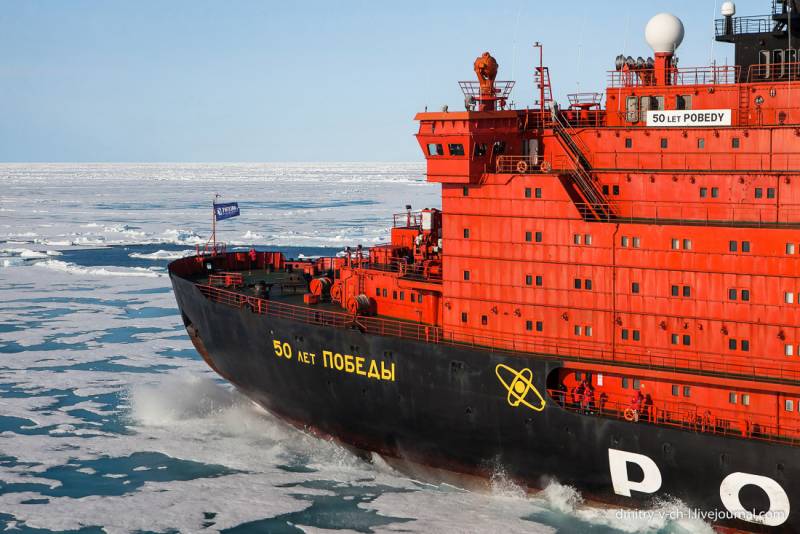
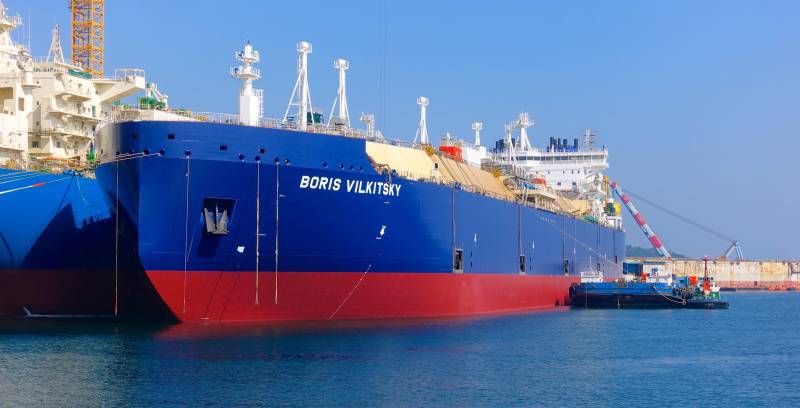
Information